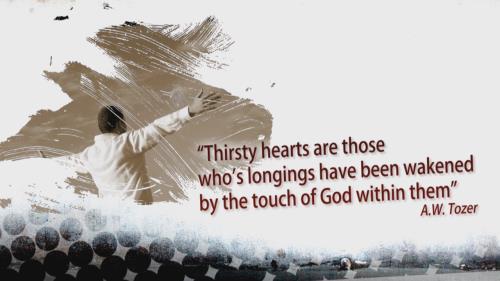-
The Blessing Of Holy Hunger Series
Contributed by Kraig Pullam on Nov 28, 2017 (message contributor)
Summary: God feeds the one who starves for this which only He supplies
In the Antarctic summer of 1908-9, Sir Ernest Shackleton and three companions attempted to travel to the South Pole from their winter quarters. They set off with four ponies to help carry the load. Weeks later, their ponies dead, rations all but exhausted, they turned back toward their base, their goal not accomplished. Altogether, they trekked 127 days. On the return journey, as Shackleton records in The Heart of the Antarctic, the time was spent talking about food -- elaborate feasts, gourmet delights, sumptuous menus. As they staggered along, suffering from abdominal pain, not knowing whether they would survive, every waking hour was occupied with thoughts of eating. Jesus, who also knew the ravages of food deprivation, says, "Blessed are those who hunger and thirst for RIGHTEOUSNESS." As with Shackleton's obsession with food in the midst of circumstances of scarcity and possible death, it offers us a divine glimpse of the passion Christ intends for our quest toward righteousness.
The Sermon on the Mount is a masterful presentation of the conditions for entering the Kingdom of Christ and the characteristics of those who are Kingdom inheritors. In the first twelve verses of this sermonic discourse, Christ (the Life-Giver-King) tells His audience that He has come for the expressed interest of bringing them happiness. Immediately, it is clear, that this happiness is antithetical to the world’s definition of happiness. But, rather this is happiness, inner joy, from God’s perspective. It is joy that takes place on the inside irrespective of circumstances taking place on the outside. Any good preacher knows that you have to start a sermon with something that will capture and captivate your listeners. And as Christ—this Preacher par excellent—steps on the scene, He knows that the world is looking for happiness then, much as they are now. People want to know blessedness and find meaning in life. And consequently, He starts His sermon on the mount by saying, “I’m offering you happiness,” however, the audience did not expect what they heard next. In a real sense, Jesus comes and says to them that they could be happy in the way they least expect happiness to be found—in a paradox that calls for a declaration of dependence, a filing of spiritual bankruptcy, a self-inflicting garnishing of your own worldly wages, an awareness of spiritual destitution, a bent on mourning and a self-assessment of one’s weakness in the presence of a powerful God.
The fourth beatitude, in Matthew 5:6, is the peak and the pinnacle of the Beatitudes of our Lord. It is as if the citizen of the kingdom is climbing a proverbial mountain, and he or she is headed toward Beatitude four. Take note of the first three steps. First, there is the REALIZATION of need: blessed are the poor in spirit, for theirs is the kingdom of heaven. Second, there is the REPENTANCE over the REALIZATION of that need: blessed are those who mourn, for they shall be comforted. And then, there is RECEPTIVITY toward finally doing it God’s way: blessed are the meek, for they shall inherit the earth. And it is then, and only then, that the Kingdom citizen attains the mountain of victory as his hunger and thirst is satisfied by his Sovereign Lord. From then on, the kingdom life is “downhill” as, instead of EXCERCISES of the heart, we behold the EVIDENCES of the heart. And, while, the final four beatitudes and ‘blesseds’ from our Lord illustrate the position of the heart toward one’s fellowman; indeed, the first four Beatitudes show one’s position with God. It is in leading us to the mountain peak of the Beatitudes that Jesus turns one of the plain, elemental human instincts toward spiritual use for our own understanding, “Hunger” and “Thirst,” the most demanding of the human appetites, are commonly used to express strong desire and need.
I. THE POSITION OF THE HUNGRY HEART
There's a story told about a proud young man who came to Socrates asking for knowledge. He walked up to the muscular philosopher and said, "O great Socrates, I come to you for knowledge." Socrates recognized a pompous numbskull when he saw one. He led the young man through the streets, to the sea, and chest deep into water. Then he asked, "What do you want?" "Knowledge, O wise Socrates," said the young man with a smile. Socrates put his strong hands on the man's shoulders and pushed him under. Thirty seconds later Socrates let him up. "What do you want?" he asked again. "Wisdom," the young man sputtered, "O great and wise Socrates." Socrates crunches him under again. Thirty seconds passed, thirty-five. Forty. Socrates lets him up. The man was gasping. "What do you want, young man?" Between heavy, heaving breaths the young man wheezed, "Knowledge, O wise and wonderful..." Socrates then jams him under again Forty seconds pass; fifty. "What do you want?" "Air!" he screamed. "I need air!" "When you want knowledge as you have just wanted air, then you will have knowledge."

 Sermon Central
Sermon Central



